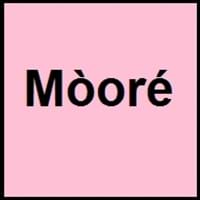Countries
Burkina Faso
Barbados, Belize, Botswana, Cameroon, Canada, Dominica, Fiji, Ghana, India, Ireland, Jamaica, Kenya, Malta, Mauritius, Micronesia, Nigeria, Pakistan, Philippines, Rwanda, Saint Kitts and Nevis, Samoa, Sierra Leone, Singapore, Somaliland, South Africa, South Sudan, Sudan, Tanzania, Trinidad and Tobago, Uganda, United Kingdom, Zambia, Zimbabwe
National Language
Benin, Burkina Faso, Ghana, Ivory coast, Mali, Togo
Anguilla, Antigua and Barbuda, Bahamas, Barbados, Belize, Bermuda, Cayman Islands, Gibraltar, Grenada, Guam, Guyana, Jersey, Montserrat, Nauru, Singapore, Trinidad and Tobago, United Kingdom, United States of America
Second Language
Not spoken in any of the countries
India, Nigeria, Pakistan, Singapore
Speaking Continents
Asia
Africa, Asia, Australia, Europe, North America, Oceania, South America
Minority Language
Not spoken in any of the countries
South Africa
Regulated By
Not Available
Not Available
Interesting Facts
- Mossi languages use pitch to distinguish meanings.
- Mossi is the 2nd largest ethnic group in Ivory Coast.
- Most of the English words begin with the letter S than any other letter.
- English is third most commonly spoken language in the world.
Similar To
Dagbani Language
Not Available
Derived From
Not Available
Latin
Alphabets in
Mossi-Alphabets.jpg#200
English-Alphabets.jpg#200
Writing Direction
Not Available
Left-To-Right, Horizontal
Thank You
Laafi bala
Thank you
How Are You?
Laafi beme ?
How are you?
Good Night
Ne y yungo
Good Night
Good Evening
ne y zabre
Good Evening
Good Afternoon
Kia ora
Good Afternoon
Good Morning
Ne y yibeogo
Good Morning
Bye
Wend na kon-d nindaare
Bye
I Love You
Kei te aroha au ki a koe
I love you
Excuse Me
Y gafare
Excuse Me
Dialect 1
Ouapadoupou
American English
Where They Speak
Burkina Faso
United States of America
How Many People Speak
Not Available
Dialect 2
Saremde
Hiberno-English
Where They Speak
Burkina Faso
Republic of Ireland, United Kingdom
How Many People Speak
Not Available
Dialect 3
Taolende
Welsh English
Where They Speak
Burkina Faso
United Kingdom
How Many People Speak
Not Available
Second Language Speakers
Not Available
Native Name
Mosse
English
Alternative Names
Not Available
Not Available
German Name
Mossi-Sprache
Englisch
Pronunciation
Not Available
/ˈɪŋɡlɪʃ/
Ethnicity
Mossi
Not Available
Origin
Not available
5th Century AD
Language Family
Niger-Congo Family
Indo-European Family
Subgroup
Western Sudanic
Not Available
Branch
Gur (Voltaic)
Not Available
Early Forms
No early forms
Old English, Middle English, Early Modern English and English
Standard Forms
Mossi
Standard English
Language Position
Not Available
Signed Forms
Not Available
Signed English
Scope
Individual
Individual
ISO 639 1
No data Available
en
ISO 639 6
Not Available
engs
Glottocode
moss1236
stan1293
Linguasphere
No data Available
52-ABA
Language Type
Living
Living
Language Linguistic Typology
Not Available
Subject-Verb-Object
Language Morphological Typology
Not Available
Analytic, Fusional, Isolating, Synthetic
Mossi and English Greetings
People around the world use different languages to interact with each other. Even if we cannot communicate fluently in any language, it will always be beneficial to know about some of the common greetings or phrases from that language. This is where Mossi and English greetings helps you to understand basic phrases in Mossi and English language. Mossi word for "Hello" is Kia ora or English word for "Thank You" is Thank you. Find more of such common Mossi Greetings and English Greetings. These greetings will help you to be more confident when conversing with natives that speak these languages.
Mossi vs English Difficulty
The Mossi vs English difficulty level basically depends on the number of Mossi Alphabets and English Alphabets. Also the number of vowels and consonants in the language plays an important role in deciding the difficulty level of that language. The important points to be considered when we compare Mossi and English are the origin, speaking countries, language family, different greetings, speaking population of these languages. Want to know in Mossi and English, which language is harder to learn? Time required to learn Mossi is 30 weeks while to learn English time required is 6 weeks.





